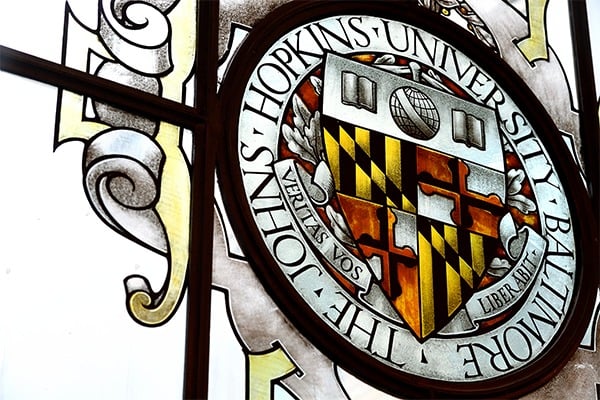41 multidisciplinary endeavors have been selected to receive support this year from Johns Hopkins University’s Discovery Awards program. Each project team is made up of members from at least two JHU entities who aim to solve a complex problem and expand the horizons of knowledge. Eight of these endeavors include faculty from the Department of Biomedical Engineering.
Altogether, the winning project teams—chosen from a record 274 proposals—include 136 individuals representing 11 Johns Hopkins entities.
“As the past year has shown, the urgent challenges we face as a society require not just daring new approaches, but also cross-cutting, multidisciplinary collaborations,” says Ronald J. Daniels, president of Johns Hopkins University. “This year’s proposals—in number and caliber—demonstrate the extraordinary spirit of innovation and partnership intrinsic to our university. These awards will empower our faculty to work in concert together across our community in pursuit of groundbreaking research and new fields of study.”
The Discovery Awards program was announced in early 2015, as was the Catalyst Awards program for early-career researchers. Together the two programs represent a $30 million commitment by university leadership, along with the deans and directors of JHU’s divisions, to faculty-led research.
The Discovery Awards are intended to spark new interactions among investigators across the university rather than to support established projects. Teams can apply for up to $100,000 to explore a new area of collaborative work with special emphasis on preparing for an externally funded large-scale grant or cooperative agreement.
This year’s record pool of applications also required a significant number of reviewers: more than 70 faculty members from across the university were called upon for their input.
“Discovery Awards have been transformative for the Johns Hopkins community,” says Denis Wirtz, vice provost for research. “These have seeded new research collaborations among faculty in different schools and units of the university, spanning many fields of investigation. The scholarly and financial returns have been remarkable.
Research endeavors that include faculty from Hopkins BME are:
A Bio-engineering Approach to Adjuvant T-cell vaccines– Maxim Rosario (Medicine), Scott Wilson (Medicine) & Jay Bream (Public Health)
Algorithmic Development to Assess Shape and Functional Trajectory in Subcortical Structures in Hippocampal-Sparing Prophylactic Cranial Irradiation in Limited- Stage Small Cell Lung Cancer– Siamak Ardekani (Engineering), Kristin Redmond (Medicine) & Laurent Younes (Engineering)
Boosting Progressive Learning in Humans and Machines– Christopher Honey (Arts & Sciences) & Joshua Vogelstein (Engineering)
Evaluating and Overcoming Performance Biases Against Underrepresented Populations in Deep Learning for Diagnosis of Disease on Medical Images– Paul Yi (Medicine), Jeremias Sulam (Engineering), Ilya Shpitser (Engineering), Cheng Ting Lin (Medicine), Tin Yan Alvin Liu (Medicine) & Elise Ng (Medicine)
Harnessing Peripheral Nerve Signals from Muscle with a Wireless, Implantable Device for Intuitive Prosthesis Control– Sami Tuffaha (Medicine), Nitish Thakor (Engineering), Gabriela Cantarero (Medicine) & Luke Osborne (Applied Physics Lab)
Interrogation of the Impact of Selection and Competition on the Evolution of Human Pancreatic Cancer Precursor Lesions– Elana Fertig (Medicine), Rachel Karchin (Engineering) & Laura Wood (Medicine)
Long Read Sequencing to Determine the Relationship between Pathogenic Repeat Expansion and Pathoclisis in C9orf72 ALS/FTD– Solange Brown (Medicine), Winston Timp (Engineering), Dwight Bergles (Medicine) & Loyal Goff (Medicine)
Preventing Opioid Abuse in Chronic Pancreatitis through Local, Sustained Bupivacaine Delivery from Stents– Jay Pasricha (Medicine), Christopher Stiles (Applied Physics Lab) & Kunal Parikh (Engineering)
The full list of recipients and their projects is available on the Office of Research website.

